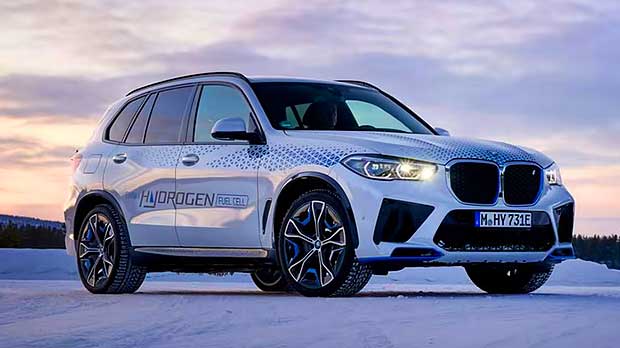
The latest reports from the media reveal that BMW is ready to manufacture large series fuel cell SUVs from the year 2025 onwards. However, earlier the company confirmed that they are more willing to offer iX5 Hydrogen only in the small series for the current year.
This recent report came from a popular Japanese business paper named Nikkei and the content was written concerning Pieter Nota, the sales chief at BMW. The newspaper states that BMW is planning to lead mass production, as well as sales for its newly proposed fuel cell SUVs from the year 2025, and this project, will be led in collaboration with Toyota.
If we look to the past, the iX5 Hydrogen was presented by BMW in September 2021 at IAA mobility. It is expected that the small series production will begin just within a few weeks and interested buyers will be able to get their vehicles delivered by the end of the year. Note that iX5 Hydrogen makes use of fuel cells manufactured by Toyota; however, the integration of various components added inside these vehicles along with Toyota fuel cells is done by BMW itself.
The company has revealed the technical details behind this new production in the year 2020. They unveiled that up to 6kg of hydrogen is stored in two tanks (700 bars each). These tanks are designed using carbon fiber composite material. The fact sheets reveal that the Toyota fuel cell available in the engine compartment is capable enough to produce 125 kW; however, the e-motor produces 275 kW. In case the electric motor needs higher than 125kW, the fuel cell can help with that. Additional power can be further supplied from a power buffer battery which is attached above the electric motor.
A few years ago, BMW repeatedly talked about FCEVs but they couldn’t present any concrete plans on this concept and the series production vehicle models for hydrogen electric drive stayed out of the market. But with the new class of electric vehicles that will run on the roads in 2025, BMW initially planned to design fuel cell cars with the help of the same technology; however, they later shifted to battery-electric drives.
Although Nota has not yet provided any specific comment on the upcoming models, he stated that the company finds hydrogen fuel cell technology more useful for creating larger SUVs. Fuel cells for this large-scale production may be also purchased from Japan. In a recent interview, Nota also stated that they have so many projects that are running in collaboration with Toyota.
BMW is currently interested to design electric-powered cars that are expected to make up almost 50% of its total sales in the year 2023. However, the company in a recent interview also pointed out a few challenges in the way of this technology – mainly charging issues. But as the current generations are more curious about the latest technologies including efficient combustion engines, hydrogen vehicles, and battery electric vehicles, it is necessary to do enough investment in this sector.
Citations
https://www.electrive.com/2022/08/15/bmw-considers-producing-fuel-cell-suvs-from-2025/